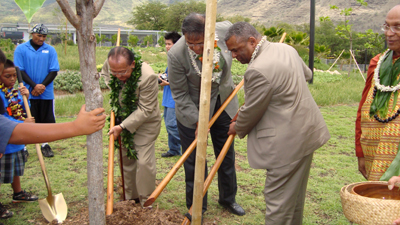| HUD-PH62
Larry Bush (415) 489-6414 | For
Release Wednesday June 2, 2010 |
HUD ANNOUNCES $16 MILLION IN COMMUNITY DEVELOPMENT AND AFFORDABLE HOUSING IN HONOLULU
 Senator Inouye, Mayor Mufi Hannemann and HUD Deputy Secretary at blessing and dedication. |
SAN FRANCISCO - U.S. Housing and Urban Development Deputy Secretary Ron Sims today announced that Honolulu will receive more than $16 million to support community development and produce more affordable housing. HUD's annual funding will assist in the development of public facilities, public service, housing for the homeless, rental housing assistance, special needs housing and community economic development.
"This funding provides the building blocks needed to improve communities," said Sims. "Now, more than ever, these grants promote neighborhood development, produce affordable housing, and help extremely low-income persons find their place in their communities."
Sims made the announcement during a tour of the Boys and Girls Club of Hawaii, accompanied by U.S. Senator Daniel Inouye. The facility is LEED certified with state-of-the-art implementation of sustainable procedures and features.
"Hawaii's working families were hit hard by the economic downturn and the
need for federal assistance to grow communities and combat homelessness
has never been greater," said Senator Inouye. "These funds promote economic development and lend aid to those struggling to find shelter for their families."
The funding announced today includes:
- $ 10,540,071 in Community Development Block Grant (CDBG) funds;
- $ 4,566,510 in HOME Investment Partnerships (HOME) funding;
- $ 428,723 in Emergency Shelter Grant (ESG); and
- $ 473,440 for Housing Opportunities for Persons with AIDS (HOPWA).
$16,008,744 TOTAL
Since 1974, HUD's Community Development Block Grant (CDBG) Program has provided approximately $132 billion to state and local governments to target their own community development priorities. The rehabilitation of affordable housing and the improvement of public facilities have traditionally been the largest uses of CDBG although the
program is also an important catalyst for job growth and business opportunities. Annual CDBG funds are distributed
to communities according to a statutory formula based on a community's population, poverty, and age of its
housing stock, and extent of overcrowded housing.
HOME (HOME Investment Partnerships Program) is the largest federal block grant to state and local governments designed exclusively to produce affordable housing for low-income families. Since 1992, more than 600 communities have completed nearly 950,000 affordable housing units, including 403,000 for new homebuyers. In addition,
224,000 tenants have received direct rental assistance. For more info, go to the HOME website (http://www.hud.gov/offices/cpd/affordablehousing/programs/home/)
Emergency Shelter Grants (ESG) provides homeless persons with basic shelter and essential supportive services.
It can assist with the operational costs of the shelter facility, and for the administration of the grant. ESG also provides short-term homeless prevention assistance to persons at imminent risk of losing their own housing due to eviction, foreclosure, or utility shutoffs.
HUD's Housing Opportunities for Persons with AIDS (HOPWA) grants are distributed to states and cities based on the number of AIDS cases reported to the Centers for Disease Control and Prevention. The grants provide resources for operating community residences and providing rental assistance and support services to individuals with HIV/AIDS
and their families. In addition, the HOPWA program also helps many communities develop strategic AIDS housing
plans and fill in gaps in local systems of care. A stable home environment is a critical component for low-income persons managing complex drug therapies and potential side effects from their treatments.
###
HUD's mission is to create strong, sustainable, inclusive communities and quality affordable homes for all. HUD is working to strengthen the housing market to bolster the economy and protect consumers; meet the need for quality affordable rental homes: utilize housing as a platform for improving quality of life; build inclusive and sustainable communities free from discrimination; and transform the way HUD does business. More information about HUD and its programs is available on the Internet at www.hud.gov and espanol.hud.gov.



